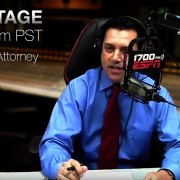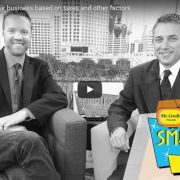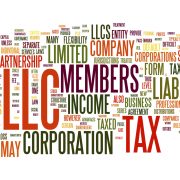Jeffrey B. Kahn, Esq. and Windus A. Fernandez Brinkkord Discusses The Markets, Tips If You Owe Taxes and the IRS On ESPN Radio – July 15, 2016 Show
Jeffrey B. Kahn, Esq. and Windus A. Fernandez Brinkkord Discusses The Markets, Tips If You Owe Taxes and the IRS On ESPN Radio – July 15, 2016 Show
Topics Covered:
1. Special Guest: Chris Rupp, Franchise Owner; PrideStaff, PrideStaff Financial
2. Youth Optimism Powers U.S. Economy
3. Tips If You Owe Taxes
4. Call in Question:
a. I want to invest in an IRA but am not sure how to go about it. At what earnings point is it more beneficial to go the Traditional Retirement route and not the Roth Retirement route?
Jeff states: Good afternoon! Yes sometimes we just have to take the money and run!
Welcome to Inside Advantage – Your Financial And Tax Radio Show.
This is Board Certified Tax Attorney, Jeffrey B. Kahn, the principal attorney of the Law Offices Of Jeffrey B. Kahn, P.C. and head of the KahnTaxLaw team.
Windus states:
And this is Licensed Financial Planner, Windus A. Fernandez Brinkkord, Senior Vice President Of Investments at Trilogy Financial Services.
You are listening to our weekly radio show where we talk everything about finances and taxes from the ESPN 1700 AM Studio in San Diego, California.
Jeff states:
When it comes to knowing tax laws and paying taxes, let’s face it — everyone in the U.S. is either in tax trouble, on their way to tax trouble, or trying to avoid tax trouble!
Windus states:
And whether you are on the rebound or flying high, we have the information you need to make sound financial decisions and map out your strategy for success.
Jeff states:
Our show is broadcasted each Friday at 2:00PM Pacific Time and replays are available on demand by logging into the KahnTaxLaw website at www.kahntaxlaw.com.
Jeff states:
For today’s show we have coming up:
Segment 2 material: Youth Optimism Powers U.S. Economy
Windus states:
Also coming up is:
Segment 3 material: Tips If You Owe Taxes
And of course towards the end of our show, we will be answering some of your questions.
Jeff starts chit chat with Windus.
Jeff states: At this time, we would like to introduce you to our special guest:
Chris Rupp, Franchise Owner; PrideStaff, PrideStaff Financial
1. Can you tell us a little bit about PrideStaff?
2. What is PrideStaff Financial?
3. What was the drive behind starting up your own staffing and recruiting enterprise?
4. About how many companies around the Greater San Diego area does your company provide temporary work for?
5. Would you be able to tell us off the top of your head, what percentage of your temporary associates go on to become direct hire employees?
6. Where do you advertise for new talent to fill future positions?
7. Does PrideStaff provide benefits for the employees being sourced for temporary positions? How does that work within PrideStaff?
8. Do you have a list of associates who match up to a specific positions criteria, or do you have a first call first serve basis for available assignments?
9. Have you ever considered another path for yourself outside staffing services?
10. What would be your most valuable bit of advice for anyone interested in owning their own business?
Well it’s time for a break but stay tuned because we are going to tell you Youth Optimism Powers U.S. Economy.
You are listening to Board Certified Tax Attorney, Jeffrey B. Kahn, and Licensed Financial Planner, Windus A. Fernandez Brinkkord on Inside Advantage on ESPN.
BREAK
Welcome back. This is Inside Advantage – Your Financial And Tax Radio Show on ESPN and you are listening to Board Certified Tax Attorney, Jeffrey B. Kahn, and Licensed Financial Planner, Windus A. Fernandez Brinkkord.
And be aware of the special offer that Windus has for you: Windus PLUG: Trilogy Financial Services will provide you with a retirement cash flow analysis which is a $600.00 value for free as long as you mention the Inside Advantage Radio Show when you call to make an appointment. Call my office to make an appointment to meet with me, Windus A. Fernandez Brinkkord. The number to call is 858.314.5169. That is 858.314.5169. Or visit www.guideyourstory.com.
Youth Optimism Powers U.S. Economy
http://on.wsj.com/29HcJ9i
• Millennials and baby boomers seem to have different feelings about the Economy
–>This is a decades long generational issue. Often people in their 20’s & 30’s are more optimistic than those at the end or towards the end of their working careers. Chris, have you noticed this in your work place or between you & your daughters?
• Specifically, confidence among the 35 & below crowd is back at pre-recession levels where as those about 55 is far lower and even decreasing in the last year. From your experience, what would be contributing to this decrease? Do you think it is work place happiness? Or watching the investments not have a good year? Concern over the Presidential election?
• Older Americans pulled back in spending in the first quarter of 2016 while younger ones increased, according to Chase credit & debt cards. Honestly, if I didn’t have a lot of money invested, I may not have felt the pain of the first quarter in 2016 as much. Right? How connected would I be to the economy?
• Younger people feel that having to bid for a house is a sign of a strong economy. Some older people get worried it is a sign of a housing bubble.
• Now this is great but the youth cannot carry the economy:
–>Many youths are burdened with high student loans that will ultimately prevent them from buying a home. Especially without a parent co-signer on that house.
–>Millennials will not see pay raises at a rate in which can keep the economy going like baby boomers could.
• Businesses are shifting who they target:
–>they used to target retirees or people who had time and money to spend. They are now focusing on tired parents that are working OR “stressed-out young professionals”…Todd Leff, chief executive and Hand & Stone, a Pennsylvania based massage chain.
–>businesses are even moving to advertise on Facebook
• Readings on consumer confidence for these two groups has ultimately ebbed and flowed but in June it was nearing a record. In August of 2015, was when it created that record originally?
• Youth are benefiting from things like a raise in minimum wage whereas older individuals are being hurt by rising medical bills while on a fixed income. Chris, what do you think of this? Do you think this is a broad nationwide analysis or do you think this applies to your feelings?
• Some events that impacted confidence across the board:
–>Debt-ceiling fight of 2011
–>Federal government shutdown in 2013
One event that didn’t:
–>Brexit? At least here in the U.S. it didn’t impact our Millennials! Whereas retired individuals saw a huge impact, albeit a short one, on their investments. Making them feel more uneasy then they already do.
Windus PLUG: Trilogy Financial Services will provide you with a retirement cash flow analysis which is a $600.00 value for free as long as you mention the Inside Advantage Radio Show when you call to make an appointment. Call my office to make an appointment to meet with me, Windus A. Fernandez Brinkkord. The number to call is 858.314.5169. That is 858.314.5169. Or visit www.guideyourstory.com.
Jeff states: Stay tuned because after the break we are going to tell you some tips if you owe taxes.
You are listening to Board Certified Tax Attorney, Jeffrey B. Kahn, and Licensed Financial Planner, Windus A. Fernandez Brinkkord on Inside Advantage on ESPN.
BREAK
Jeff states: Welcome back. This is Inside Advantage – Your Financial And Tax Radio Show on ESPN and you are listening to Board Certified Tax Attorney, Jeffrey B. Kahn, and Licensed Financial Planner, Windus A. Fernandez Brinkkord.
Calling into the studio from my Walnut Creek Office is my associate attorney, Amy Spivey.
Chit chat with Amy
And be aware of the special Offer that I have for you: PLUG: The Law Offices Of Jeffrey B. Kahn, P.C. will provide you with a Tax Resolution Plan which is a $500.00 value for free as long as you mention the Inside Advantage Radio Show when you call to make an appointment. Call my office to make an appointment to meet with me, Jeffrey Kahn, right here in San Diego or at one of my other offices close to you. The number to call is 866.494.6829. That is 866.494.6829.
Tips If You Owe Taxes.
Jeff asks: So what is the first step in the IRS Collection process where you owe money to the IRS?
Amy replies: Mailed Tax Bills. If you owe taxes, you will first receive a bill in the U.S. mail from the IRS which tells you your balance owed through a certain date indicated on the bill. Don’t fall for those calls from people claiming to be the IRS threatening criminal action against you if you don’t pay the amount they are demanding. The IRS will never make an initial contact with you by telephone without first having sent you written notice that you owe the IRS or are under examination. Of course if you have the available funds, you should pay the balance no later than the date indicated in the bill to avoid any extra charges. If you can’t pay in full, keep in mind that interest and penalties continue to accrue on the balance so any payment made to IRS will result in lower accruals of interest and penalties for the future.
Windus asks: Is there a preferred method to pay your bill to IRS?
Amy replies: Use IRS Direct Pay. When paying a balance from an IRS tax bill consider using IRS Direct Pay. It’s the safe, easy and free way to pay from your checking or savings account. You can pay your tax in just five simple steps in one online session. Just click on the “Payment” tab on IRS.gov.
Windus asks: What about a taxpayer who does not have the funds now but is expecting substantial funds soon like from a settlement or inheritance or maybe even getting a loan?
Amy replies: Full Payment Agreements of up to 120 days. If you owe more tax than you can pay, you may qualify for more time -up to 120 days- to pay in full. You do not have to pay a user fee to set up a short-term full payment agreement. However, the IRS will charge interest and penalties until you pay in full.
Jeff states: But let’s say you are a taxpayer who cannot full pay now or even in the next 120 days, what do you do?
Amy replies: Apply for an installment agreement. For one thing if you’re financially unable to pay your tax debt immediately, you can make monthly payments through an installment agreement. Before applying for any payment agreement, you must file all required tax returns and if you are required to make estimated tax payments, you must be current in making those payments. The IRS calls this “being in current compliance”. By being in current compliance, the installment agreement can now cover all tax periods with outstanding balances.
Windus asks: Is there only one type of installment agreement with IRS?
Amy replies: Actually Windus many people don’t know that there are different types of installment agreements in place with IRS.
Amy states: “No Verification” Installment Agreements. For individuals who owe $50,000 or less in combined individual income tax, penalties and interest, OR businesses that owe $25,000 or less in payroll taxes, you can have an installment agreement set up with IRS without presenting any financial information.
Jeff states: Under these agreements the IRS will usually rely on oral representations made and not require any proof of income or bank statements. Nevertheless, when calling the IRS you still must be prepared so that the request can be evaluated during that session with the agent. Having an incomplete session and then calling back the IRS with the missing information will only direct you to another agent who can have a totally different take than the first agent.
Amy states: “Full Verification” Installment Agreements. For individuals and businesses that exceed the thresholds of the No Verification Installment Agreements, the IRS will require that full financial disclosure be made with your payment plan proposal. Be careful though because the IRS does limit certain expenses and depending on the type of installment agreement entered, you may not be able to get full credit for your actual living expenses.
Jeff states: So if you are in this situation, it is best to hire tax counsel to compile the proposal and financial disclosures. If you do it on your own first and fail, your representative will not be able to “undo” what was already disclosed by you to IRS and that could then limit the representative in getting the optimum result.
Windus asks: So for someone who already has an installment agreement, what do you advise?
Amy replies: Understand Your Installment Agreement & Avoid Default. Keep in mind that your future refunds will be applied to your tax debt until it is paid in full. Pay at least your minimum monthly payment when it’s due and if paying by check include your name, address, SSN, daytime phone number, tax year and return type on your payment. Make sure the check is mailed to the right address for delivery no later than the payment due date. File all required tax returns on time & pay all taxes in-full and on time as any new liability will default your installment agreement. Make all scheduled payments even if the IRS applies your refund to your account balance. If you don’t receive your statement from IRS, send your payment to the address listed in your installment agreement.
Jeff states: There may be a reinstatement fee if your agreement goes into default. Penalties and interest continue to accrue until your balance is paid in full. If you are in danger of defaulting on your payment agreement for any reason, it is a good idea to hire tax counsel who can seek reinstatement or even a modification where you can make lower monthly payments.
Jeff continues: The IRS will generally not take enforced collection actions:
1. When an installment agreement is being considered;
2. While an agreement is in effect;
3. For 30 days after a request is rejected, or
4. During the period the IRS evaluates an appeal of a rejected or terminated agreement.
Windus states: I hear all the time that taxpayers can settle their IRS debt with an Offer In Compromise. What is that all about?
Amy replies: Check out an offer in compromise. An offer in compromise or OIC may let you settle your tax debt for less than the full amount you owe. An OIC may also be helpful if full payment may cause you financial hardship. Not everyone qualifies after all, when you are looking for a discount on your IRS liability the government wants to make sure that collectability of the full liability plus interest and penalties is highly doubtful before granting a discount.
Jeff states: An offer in compromise allows you to settle your tax debt for less than the full amount you owe. It may be a legitimate option if you can’t pay your full tax liability, or doing so creates a financial hardship.
Amy states: The IRS will consider your unique set of facts and circumstances with a focus on your income and expenses to determine your ability to pay and your asset equity.
Amy continues: The IRS will generally approve an offer in compromise when the amount offered represents the most the IRS can expect to collect within a reasonable period of time.
Windus asks: How do you know if you are eligible for an OIC?
Amy replies: Before the IRS can consider your offer, you must be current with all filing and payment requirements. You are not eligible if you are in an open bankruptcy proceeding and if you file for bankruptcy while your OIC is being evaluated, the IRS will stop evaluation and return the OIC.
Windus asks: What forms must you use to submit your offer?
Amy replies: The form to use in filing an OIC is Form 656. You must include payment of an application fee of $186.00 and a deposit towards the amount offered. Additional you must include financial disclosures. The main forms to use are Form 433-A (OIC) (for individuals) or 433-B (OIC) (for businesses) and these forms list all required documentation that must be included. Like installment agreement requests, the IRS limits certain living expenses so it make sense to engage tax counsel to pursue this process.
Windus asks: Are there any payment options available?
Amy replies: Your initial payment will vary based on your offer and the payment option you choose:
Lump Sum Cash: Submit an initial payment of 20% of the total offer amount with your application. Wait for written acceptance, then pay the remaining balance of the offer in five or fewer payments.
Periodic Payment: Submit your initial payment with your application. Continue to pay the remaining balance in monthly installments while the IRS considers your offer. If accepted, continue to pay monthly until it is paid in full.
Windus asks: What happens while an offer is being evaluated?
Amy replies:
1. Your non-refundable payments and fees will be applied to the tax liability;
2. A Notice of Federal Tax Lien may be filed;
3. Other collection activities are suspended;
4. The legal assessment and collection period is extended;
5. Make all required payments associated with your offer;
6. You are not required to make payments on an existing installment agreement; and
7. Your offer is automatically accepted if the IRS does not make a determination within two years of the IRS receipt date.
Jeff states: If your offer is accepted you must meet all the Offer Terms listed in Section 8 of Form 656, including filing all required tax returns and making all payments for the next five years; Any refunds due within the calendar year in which your offer is accepted will be applied to your tax debt; and Federal tax liens are not released until your offer terms are satisfied.
Jeff continues: If your offer is rejected you may appeal a rejection within 30 days after the determination letter has been issued by IRS. If though your offer is returned, you do not have this right of appeal and must start the OIC process all over again.
PLUG: The Law Offices Of Jeffrey B. Kahn, P.C. will provide you with a Tax Resolution Plan which is a $500.00 value for free as long as you mention the Inside Advantage Radio Show when you call to make an appointment. Call my office to make an appointment to meet with me, Jeffrey Kahn, right here in San Diego or at one of my other offices close to you. The number to call is 866.494.6829. That is 866.494.6829.
Thanks Amy for calling into the show. Amy says Thanks for having me.
Stay tuned as we will be taking some of your questions. You are listening to Board Certified Tax Attorney, Jeffrey B. Kahn, and Licensed Financial Planner, Windus A. Fernandez Brinkkord on Inside Advantage on ESPN.
BREAK
Jeff states: Welcome back. This is Inside Advantage – Your Financial And Tax Radio Show on ESPN and you are listening to Board Certified Tax Attorney, Jeffrey B. Kahn, and Licensed Financial Planner, Windus A. Fernandez Brinkkord.
And Windus and I always pleased to make our offers to our listeners where… PLUG: The Law Offices Of Jeffrey B. Kahn, P.C. will provide you with a Tax Resolution Plan which is a $500.00 value for free as long as you mention the Inside Advantage Radio Show when you call to make an appointment. Call my office to make an appointment to meet with me, Jeffrey Kahn, right here in San Diego or at one of my other offices close to you. The number to call is 866.494.6829. That is 866.494.6829.
Windus states: Windus PLUG: Trilogy Financial Services will provide you with a retirement cash flow analysis which is a $600.00 value for free as long as you mention the Inside Advantage Radio Show when you call to make an appointment. Call my office to make an appointment to meet with me, Windus A. Fernandez Brinkkord. The number to call is 858.314.5169. That is 858.314.5169. Or visit www.guideyourstory.com.
You should also know that the securities and advisory services are offered through National Planning Corporation (NPC) Member FINRA, SIPC, and a Registered Investment Advisor. Trilogy Financial Services and NPC are separate and unrelated Entities.
Jeff states: If you would like to post a question for us to answer, you can go to my website at www.kahntaxlaw.com and click on “Radio Show”. You can then enter your question and maybe it will be selected for our show.
Jeff states: And in the studio with Windus and me is our special guest Chris Rupp, Franchise Owner; PrideStaff, PrideStaff Financial.
OK Chris, as our special guest what questions have you pulled for us to answer?
Tracy from Carlsbad asks: I want to invest in an IRA but am not sure how to go about it. At what earnings point is it more beneficial to go the Traditional Retirement route and not the Roth Retirement route?
Windus answers.
Jeff states: Well we are reaching the end of our show.
Remember you can send us your questions by visiting the kahntaxlaw website at www.kahntaxlaw.com.
Windus states: Have a great day everyone!






 Follow
Follow Follow
Follow